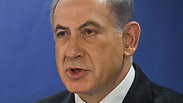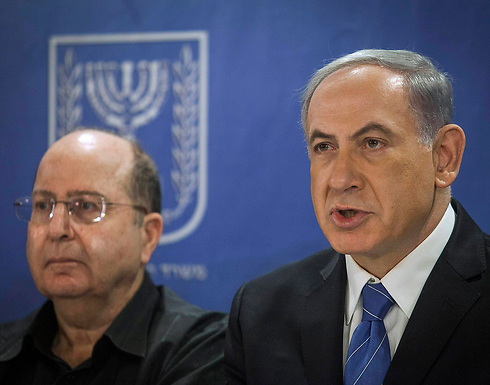
Netanyahu: Operation Protective Edge continues
In Cabinet meeting, defense minister says: If Hamas thinks it will exhaust us, it is wrong. We will not negotiate under fire; ministers say Israel should have gone for a win against Hamas, hint ceasefire talks in Cairo will end without deal.
"Operation Protective Edge continues," Prime Minister Benjamin Netanyahu said at the beginning of the weekly Cabinet meeting, indicating Israel is not backing down from its demand that negotiations to reach a long-term ceasefire in Gaza be conducted after agressions stop.
With talks underway in Cairo to reach ceasefire deal, all eyes are now pointed at Israel, with the Israeli delegation refusing to return to talks while rocket fire continues.
"At no stage did we declare its conclusion. The operation will continue until its goal is met – the restoration of a quiet for a long period. I said at the outset that the operation would take time and patience.
"Israel will not negotiate under fire and Israel will continue to take all action in order to change the current reality and bring quiet to all of its citizens. We will stand together, united and determined, until we complete the work."
Hamas and the Palestinian delegation have unified behind the demand that Israel respond to the Palestinian demands, despite the fact that Israel's willingness to extend the ceasefire unconditionally Friday was met with renewed rocket fire.
"If Hamas thinks it will exhaust us, it is wrong. We will not negotiate under fire," Defense Minister Moshe Ya'alon said.
"We entered negotiations in Cairo and Hamas decided to renew rocket fire on Israel at 6 am Friday. The IDF has hit a number of targets in response," the defense minister said.
Only Sunday morning, six rockets hit Israel's south, contributing to growing anger in Israel at the government and IDF who told residents they could return last Thursday, under the assumption the ceasefire would hold.
Responding to criticism that Israel was quick the declare an end to the fighting and told citizens it can return to the south, the defense minister said "We will not compromise until rocket fire and terror completely stop. We see the overarching political and military picture and will not finish the operation until quiet and security are returned to Israel's citizens."
"From the beginning I was of the opinion that we should've aimed for defeating Hamas," Foreign Minister Avigdor Lieberman said at the beginning of the meeting, also responding to growing public outcry.
Regarding ceasefire efforts, Lieberman also seemed to indicate that talks would not end in a result: "Hamas' minimal demands are beyond Israel's maximal position," Lieberman said Sunday, "this situation cannot continue. If my suggestions were taken we would not have been in this situation."
Interior Minister Gideon Sa'ar said "we need to destroy Hamas' military power in Gaza. It was true in the past and it is true now so as to allow the south's residents to return home."
Ceasefire efforts
Palestinian negotiators say their team will quit Egyptian-brokered talks on ending the Gaza fighting unless Israeli negotiators return to Cairo.
Israeli negotiators left Cairo on Friday, saying the team will not return as long as rocket fire from Gaza continues. Their decision to leave took place after efforts to extend a three day ceasefire already in place failed to yield results, despite Israeli willingness to extended the lull.
Beginning hours before Friday's ceasefire was set to expire, Gaza militants renewed rocket fire, demanding talks continue, and have since fired dozens of rockets and mortar shells at Israel over the weekend, including two on Sunday morning.
Bassam Salhi, a Palestinian negotiator from Palestinian President Mahmoud Abbas' PLO movement, says his team met with Egyptian mediators late Saturday.
He said Sunday: "We told the Egyptians that if the Israelis are not coming and if there is no significant development, we are leaving today."
Similar comments were made by lead negotiator Azzam al-Ahmed to AFP: "We have a meeting tomorrow with Egyptian (mediators). If we confirm that the Israeli delegation is placing conditions for its return, we will not accept any conditions," he said.
One of Hamas' central demands has been an end of the Egyptian-Israeli siege on Gaza, a demand both Egypt and Israel have rejected, but indicated willingness to ease some restrictions.
Qais Abu Laila, a member of the Palestinian negotiations team in Cairo, said that "Israel wants to regulate and not lift the siege. It is has rejected most of the Palestinian demands."
According to Abu Laila, Israel wants to renew restrictions over materials entered into Gaza and the movement of people into the Strip.
Hamas has said it wants assurances by Israel that it is willing to lift the blockade on Gaza before observing another ceasefire. Israel has said it will not open Gaza's borders unless militant groups, including Hamas, disarm. Hamas has said handing over its weapons arsenal, which is believed to include several thousand remaining rockets, is inconceivable.
Instead, one proposal circulated by the Egyptian mediators over the weekend offered a minor easing of some of the restrictions, according to Palestinian negotiators who spoke on condition of anonymity because they were not allowed to discuss internal deliberations with journalists. It was not clear if this was an Egyptian or an Israeli proposal.
Roi Kais, Noam (Dabul) Dvir, Reuters and AFP contributed to this report











